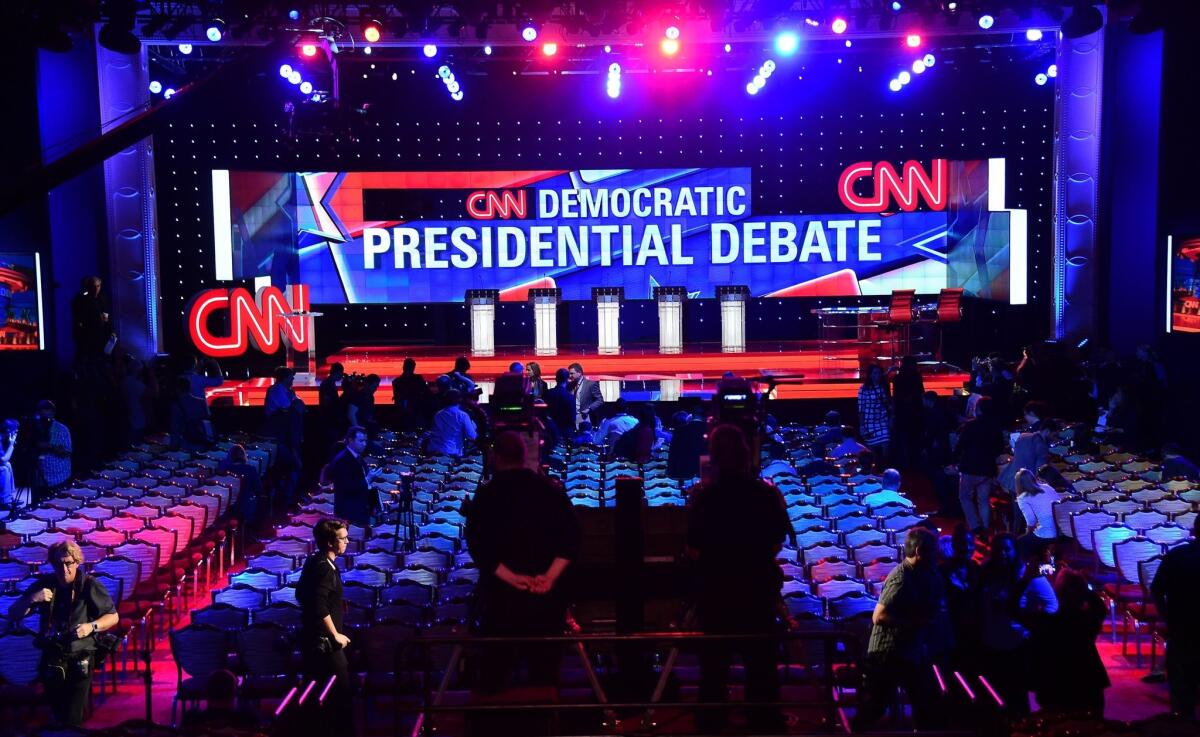Three reasons why we’re unlikely to hear much about K-12 education in tonight’s Democratic debate

Members of the media are given a preview of the debate hall at the Wynn Hotel in Las Vegas hours before the first Democratic presidential debate.
Tonight, Democratic candidates will face off in a debate hosted by Facebook and CNN in Las Vegas. The parents of America's 50.1 million K-12 public school students, though, will probably not hear all that much about the state of their children's education.
Advocates are trying to change this reality. Just this morning, Democrats for Education Reform, a group of Democrats that support reforms such as charter schools and tougher teacher evaluations, circulated a list of education issues to keep in mind.
But as we've previously reported, they might not work. Here's why:
- Who runs our schools?
-
Debates focus on national, sweeping policy issues, but the truth is, public schools are run by more than 10,000 school boards. Sure, they're affected by federal laws, such as the No Child Left Behind Act and the Individuals With Disabilities Education Act, but less than 10% of their funding comes from the federal government.
So the idea of a national public school system sounds abstract to many parents -- because towns and cities run their schools differently. Poll results illustrate that dissonance, with 55% of parents rating their local schools as an A or a B, compared with the only 28% of parents who would rate the nation's public schools the same way.
As Matthew Chingos, a senior fellow at the Urban Institute, told the Los Angeles Times before the last debate, it's hard for advocates and presidential campaigns to get parents to care about issues that might not affect their own lives. “If people like their local schools, regardless of what they think about schools nationally, they’re not going to be very likely to vote based on that issue,” Chingos said. “They’re not going to vote for someone just because that candidate is going to fix a problem with someone else’s schools.”
- The knotty politics of education
Even so, Democrats are less likely than Republicans to broach the issue. Why? Education is weirdly bipartisan, and tends to be a political minefield within the Democratic party.
Republicans, at least, can differ on the Common Core -- a set of learning standards adapted by most states -- and hew to a standard party line: by describing the Common Core as national, candidates like Louisiana Gov. Bobby Jindal can earn conservative brownie points by criticizing the federal government to overstepping into the lives of everyday citizens. (In reality, the Common Core was incentivized by the Obama administration, not required.)
It's different for Democrats, though. Teachers' unions are a huge Democratic constituent and force. Recent years have seen an emergence of groups like DFER, which split the party with its support for charter schools, and its general willingness to go head-to-head with teachers' unions. So Democrats who believe in this slate of policies often spar with union leaders like Randi Weingarten over such issues as the degree to which students' standardized tests can be used to grade teachers.
An association with these issues has been a sticking point for Hillary Rodham Clinton in particular. Clinton earned Weingarten's American Federation of Teachers' endorsement early on. But her affiliation with the Obama administration and its education policies made the support of the National Education Assn., the bigger union, a stretch. She won it only after appearing before the group and addressing their concerns.
- The softer bookends
In short, fighting for education reform could alienate Democratic constituents; fighting against it could alienate some independent voters.
The controversial nature of education policy within the Democratic party was on full display last week, when Politico reported that the Democratic presidential candidates opted to skip out on an education forum hosted by former CNN anchor Campbell Brown. Brown had hosted a similar forum with Republicans, thanks to a sponsorship by the pro-school choice conservative group American Federation for Children.
Schooling between kindergarten and high school might affect a huge swath of Americans, but it's considerably more controversial than its bookends: we're more likely to hear about pre-school and higher education tonight.
It's much easier to talk about the need to expand pre-kindergarten -- who doesn't love stumping for adorable 4-year-olds? -- than toughening rules around how teachers are hired, evaluated and fired. Clinton in particular has been vocal about the issue.
Another personal issue that speaks to voters without the weird politics of K-12 education is student loan debt and how to alleviate it. College tuition and student debt have increased significantly, posing a gigantic financial problem for many would-be students and their parents. Both Clinton and Sen. Bernie Sanders (I-Vermont) have called for a bigger role for federal government in making higher education less of a strain. Clinton released a plan to largely eliminate debt, and Sanders released a plan for the government to make college tuition free for everyone.
We'll be watching for mentions of college and pre-school. You can follow along in real-time @LATEducation.
FOR THE RECORD: An earlier version of this article misstated the name of American Federation for Children.
You can reach Joy Resmovits on Twitter @Joy_Resmovits and by email at [email protected].
Sign up for Essential California
The most important California stories and recommendations in your inbox every morning.
You may occasionally receive promotional content from the Los Angeles Times.








